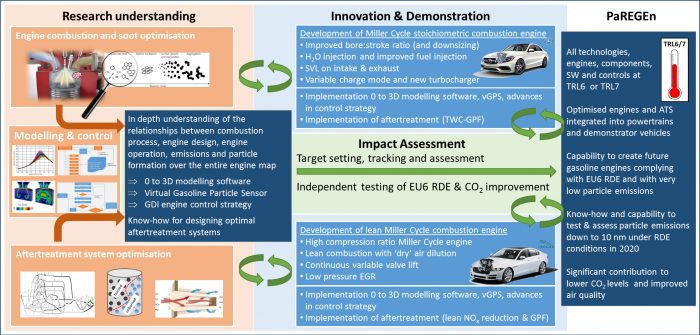PaREGEn ambition
Introduction
In spite of increasingly stringent emission standards, growing road traffic in Europe results in detrimental effects on the environment and public health to a level that is becoming unsustainable.
The challenge is to develop a new generation of engine technologies that are truly and significantly more fuel efficient than the best 2015 equivalents under real driving conditions, and to demonstrate pollutant emission levels from these technologies can meet with the upcoming Euro 6 RDE limits and particle number emissions measured with a 10 nm size threshold.
The PaREGEn project will take the lead in demonstrating at up to TRL 7 a new generation of gasoline direct injection engines achieving a ≥ 15% reduction in CO2 emissions through the optimal combination of advanced engine and robust aftertreatment technologies.
PaREGEn will result in the capability for designing and creating future gasoline engines, powertrains and vehicles complying with EU6 RDE legislation with PN emissions down to 10 nm in size. Market entry and technology roll out of the methods for development of optimal GDI engines are foreseen for 2020 and onwards.
Concept and approach
The overall concept and technical approach comprises three major elements:

- Research for improved understanding (orange box);
- Innovation and demonstration of new technologies combinations (light blue boxes), where the developed know-how, software and control
strategies are implemented in two novel optimised gasoline engined vehicles; - Independent assessment of their impact element (green box) to track the progress of the project towards reaching the targets.
Facts and Figures
Full name: Particle Reduced, Efficient Gasoline Engines
Acronym: PaREGEn
Duration: 36 months
Start date: 1 October 2016
Total budget: 12,1 M€
EC Funding: 9,95 M€
The consortium consists of 17 partners from 10 different European countries.
This project has received funding from the European Union’s Horizon2020 Programme for research, technological development and demonstration under grant agreement no 723954.


